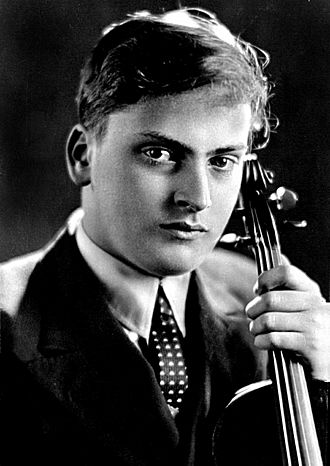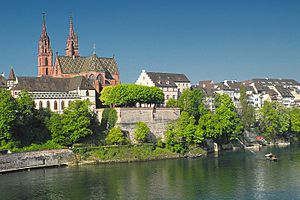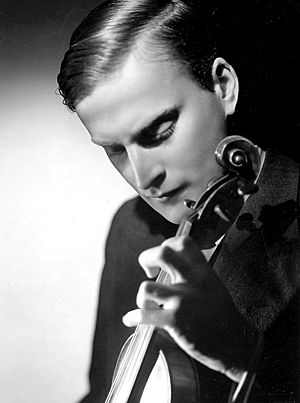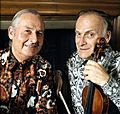Yehudi Menuhin facts for kids
Yehudi Menuhin, Baron Menuhin, OM, KBE (born April 22, 1916 – died March 12, 1999) was an amazing violinist and conductor. He was born in America but spent most of his career performing in Britain. Many people think he was one of the greatest violinists of the 20th century. He played a very special violin called the Soil Stradivarius, made by the famous Italian craftsman Antonio Stradivari.
Contents
Early Life and Musical Beginnings
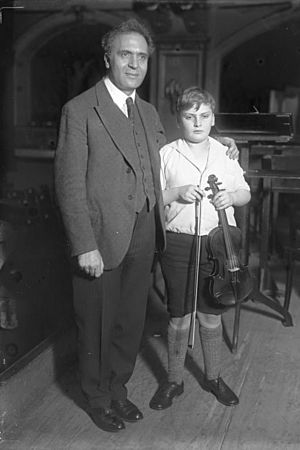
Yehudi Menuhin was born in New York City. His family was Lithuanian Jewish. His father, Moshe, came from a family of rabbis. In 1919, his parents became American citizens and changed their family name to Menuhin. Yehudi had two sisters, Hephzibah and Yaltah, who were also talented pianists.
Yehudi started learning the violin at age four. He showed incredible musical talent very early on. His first public performance was when he was only five years old, playing with another young musician. Two years later, at age seven, he played as a solo violinist with the San Francisco Symphony Orchestra.
A newspaper critic once wrote about his performance in Berlin: "A plump little blond boy steps onto the stage. He immediately wins everyone's hearts with his funny, penguin-like walk. But wait: you will stop laughing when he puts his bow to the violin to play Bach's violin concerto."
When the Menuhin family moved to Paris, Yehudi studied with the famous Romanian musician George Enescu. He also learned from Adolf Busch in Basel, Switzerland. While in Basel, he also started learning German and Italian.
He made his first recording of a concerto in 1931. It was Bruch's G minor concerto. In 1932, he recorded Edward Elgar's Violin Concerto with the composer himself conducting. He also made the first complete recording of Johann Sebastian Bach's solo violin pieces.
Yehudi was very interested in the music of Béla Bartók. He asked Bartók to write a piece for him. This piece, the Sonata for Solo Violin, was finished in 1943. Menuhin performed it for the first time in New York in 1944.
Performing During World War II
During World War II, Yehudi Menuhin performed for Allied soldiers. After the war ended in 1945, he played for people who had survived the concentration camps, like Bergen-Belsen. He was joined by the English composer Benjamin Britten on the piano.
In 1947, Menuhin returned to Germany to play with the Berlin Philharmonic orchestra. He was the first Jewish musician to do this after the Holocaust. He said he wanted to help bring back Germany's music and spirit.
Global Connections and Music Projects
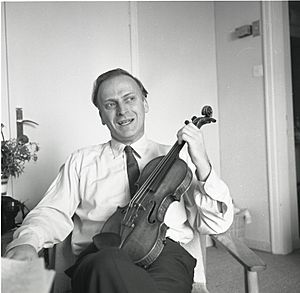
Yehudi Menuhin traveled and worked with many people around the world. He helped a young Argentine violinist named Alberto Lysy get a grant to study music. Lysy became Menuhin's only personal student. Later, Lysy started the International Menuhin Music Academy (IMMA) in Switzerland to honor him.
Menuhin also defended the German conductor Wilhelm Furtwängler, who had been criticized for working in Germany during the Nazi era. Menuhin pointed out that Furtwängler had helped many Jewish musicians escape from Nazi Germany.
In 1957, Menuhin started the Menuhin Festival Gstaad in Switzerland. In 1962, he opened the Yehudi Menuhin School in England, a special school for young musicians. He also helped create a music program at The Nueva School in California.
In 1965, he received an honorary knighthood from the British monarchy. He also became the artistic director of the Bath Festival in England, a role he held until 1968.
Menuhin had a close friendship with the Indian sitar player Ravi Shankar. They performed together at the Bath Festival in 1966 and recorded a Grammy Award-winning album called West Meets East. He also worked with the famous jazz violinist Stéphane Grappelli in the 1970s.
In 1975, Menuhin declared October 1 as International Music Day. This day is now celebrated around the world. In 1977, he co-founded Live Music Now, a charity that brings live music to people who might not otherwise experience it.
In 1983, Menuhin started the Yehudi Menuhin International Competition for Young Violinists. This competition is now one of the most important events for young violin talents worldwide. Many winners have become famous violinists, including Tasmin Little and Julia Fischer.
Later Career and Recordings
Menuhin often returned to the San Francisco Bay Area to perform with the San Francisco Symphony Orchestra. One memorable performance was of Elgar's Violin Concerto, which he had recorded with the composer many years before.
In 1978, he performed with Stéphane Grappelli during the Eurovision Song Contest.
Menuhin had a recording contract with EMI for almost 70 years. This is the longest recording contract in music history! He made his first recording at age 13 and his last when he was nearly 83. He recorded over 300 works as both a violinist and a conductor. In 2016, a huge collection of 80 CDs called The Menuhin Century was released to celebrate his life and music.
From 1984 until his death, he was the first guest conductor of Sinfonia Varsovia, an orchestra he loved working with. He also became the Principal Guest Conductor of the English Symphony Orchestra in 1991.
In 1990, Menuhin was the first conductor for the Asian Youth Orchestra. They toured around Asia with young talented musicians.
Personal Life
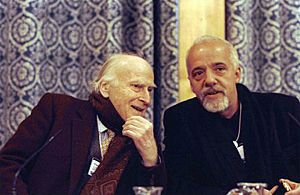
Yehudi Menuhin was married twice. First to Nola Nicholas, with whom he had two children, Krov and Zamira. After their divorce, he married the British dancer and actress Diana Gould. They had two sons, Gerard and Jeremy, who is a pianist.
The name Yehudi means "Jew" in Hebrew.
Menuhin became an honorary citizen of Switzerland in 1970 and then of the United Kingdom in 1985.
He passed away in Berlin, Germany, in 1999. After his death, the Royal Academy of Music received his personal archive. This included his sheet music, letters, photos, and musical notes.
Menuhin was a pescetarian, meaning he ate fish but no other meat.
Interest in Yoga
Yehudi Menuhin was very interested in yoga. In 1952, during a visit to India, he met an important yoga teacher named B. K. S. Iyengar. Menuhin helped Iyengar teach yoga in places like London, Switzerland, and Paris. Iyengar became one of the first well-known yoga masters to teach in Western countries.
Menuhin also took lessons from Indra Devi, who opened the first yoga studio in the U.S. in 1948. Both Iyengar and Devi were students of Krishnamacharya, a famous yoga master in India.
Famous Violins
Menuhin played many famous violins throughout his life. Perhaps the most well-known was the Lord Wilton Guarnerius 1742. Other special violins he played included the Soil Stradivarius and the Prince Khevenhüller 1733 Stradivari.
In his autobiography, Menuhin wrote: "A great violin is alive; its very shape embodies its maker's intentions, and its wood stores the history, or the soul, of its successive owners. I never play without feeling that I have released or, alas, violated spirits."
Awards and Special Honors
Yehudi Menuhin received many awards and honors for his incredible contributions to music:
- In 1965, he was made a Knight of the Order of the British Empire (KBE).
- He received the Jawaharlal Nehru Award for International Understanding in 1968.
- He became President of the International Music Council from 1969 to 1975.
- In 1972, he won the Léonie Sonning Music Prize in Denmark.
- He was honored with the Kennedy Center Honors in 1986.
- In 1987, he became a member of the Order of Merit, a very special honor in Britain.
- His recording of Elgar's Cello Concerto won the 1987 BRIT Award for Best British Classical Recording.
- He received the Glenn Gould Prize in 1990 for his lifetime of achievements.
- In 1991, he won the prestigious Wolf Prize in Arts from the Israeli Government.
- He was named a UNESCO Ambassador of Goodwill in 1992.
- In 1993, he was made a life peer, becoming Baron Menuhin.
- He received the Sangeet Natak Akademi Fellowship in India in 1994.
- In 1997, he received the Prince of Asturias Award in the Concord category, sharing it with cellist Mstislav Rostropovich.
- Many universities, including Oxford and Cambridge, gave him honorary doctorates.
- The concert hall at the European Parliament in Brussels is named the "Yehudi Menuhin Space."
- He was given the "Freedom of the City" in Edinburgh, Bath, Reims, and Warsaw.
- He held Gold Medals from the cities of Paris, New York, and Jerusalem.
|
Films Featuring Menuhin
- In the 1943 film Stage Door Canteen, Menuhin performed two violin solos: "Ave Maria" and "Flight of the Bumble Bee."
- He provided the violin solos for the 1946 film The Magic Bow.
- He was featured in the 1979 television series The Music of Man.
Images for kids
-
Stéphane Grappelli (left) with Menuhin in 1976
See Also
 In Spanish: Yehudi Menuhin para niños
In Spanish: Yehudi Menuhin para niños
 | James Van Der Zee |
 | Alma Thomas |
 | Ellis Wilson |
 | Margaret Taylor-Burroughs |


